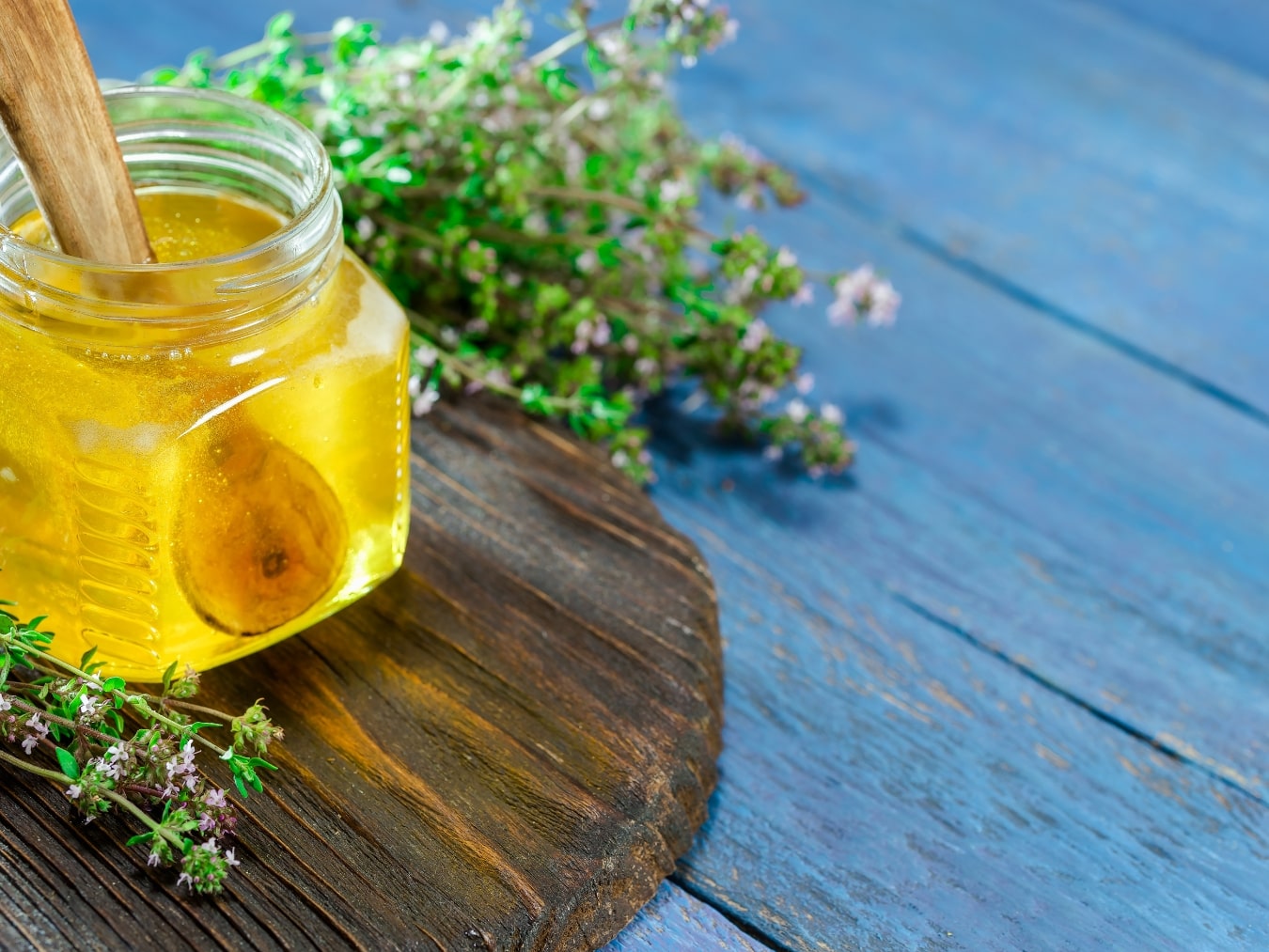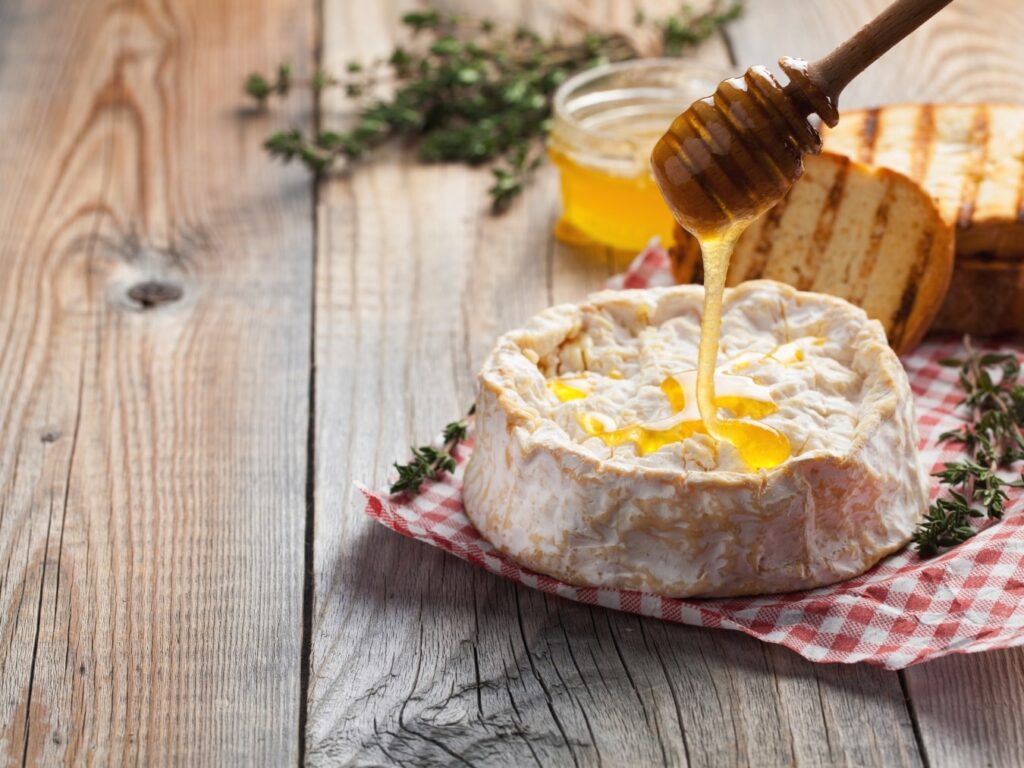
Thyme honey is a unique and highly prized variety of honey made from the nectar collected by bees from thyme flowers (Thymus spp.), a herb native to the Mediterranean region and parts of Europe. Renowned for its distinct flavor, therapeutic properties, and rich history, thyme honey has captivated honey lovers, natural health enthusiasts, and culinary connoisseurs alike. This article delves into everything you need to know about thyme honey—from how it’s made to its health benefits, uses, and tips on buying quality thyme honey.
What Is Thyme Honey?
Thyme honey is a monofloral honey, which means it’s primarily derived from the nectar of a single type of flower—in this case, thyme. The thyme plant, a low-growing shrub with small purple or pink flowers, blooms typically during the summer months. Bees foraging during this period gather nectar almost exclusively from these blooms, resulting in a fragrant and flavorful honey that carries the essence of the thyme plant.
Thyme honey is most famously produced in Greece, particularly on the islands such as Crete and Kalymnos, but it’s also made in Spain, Italy, France, and parts of Turkey. The quality and characteristics of thyme honey can vary depending on the specific thyme species, regional climate, and local soil composition.
Characteristics and Flavor Profile of Thyme Honey
Thyme honey is easily recognized by its:
- Amber to reddish-golden color
- Strong, aromatic fragrance, often herbaceous or slightly medicinal
- Rich, bold taste with hints of wild herbs, earthy sweetness, and a lingering floral finish
It’s thicker and more intense in flavor than many other floral honeys, making it a popular choice among those who enjoy robust natural sweeteners. Some high-quality thyme honey may even have subtle peppery, resinous, or smoky undertones.
Health Benefits of Thyme Honey
Thyme honey doesn’t just taste amazing—it’s also revered for its medicinal properties, many of which are inherited from the thyme plant itself. These benefits include:
1. Antibacterial and Antimicrobial Action
Like other raw honeys, thyme honey contains natural hydrogen peroxide and other antimicrobial compounds. Studies have shown thyme honey to be effective against a range of pathogens, making it useful for wound healing, minor burns, and sore throats.
2. Rich in Antioxidants
Thyme honey is high in polyphenols and flavonoids, which help neutralize free radicals in the body. These antioxidants can support healthy aging, reduce inflammation, and lower the risk of chronic diseases.
3. Cough and Cold Relief
Thanks to its soothing texture and antimicrobial properties, thyme honey is a popular natural remedy for coughs, sore throats, and congestion. It can be taken alone or combined with warm herbal teas like thyme, ginger, or chamomile.
4. Digestive Health
Thyme honey may support digestive function by soothing the stomach, easing gas, and reducing bloating. Its natural enzymes can also assist in breaking down food and improving nutrient absorption.
5. Boosts Immunity
With its combination of antimicrobial compounds and vitamins, thyme honey may enhance the immune system and help the body resist infections during flu season or periods of stress.
Culinary Uses of Thyme Honey

Thyme honey shines in both sweet and savory culinary applications. Its bold and herbal flavor makes it more versatile than milder honeys. Here are some creative ways to use it:
- Drizzle over cheeses, especially goat cheese, brie, or feta
- Mix into marinades for lamb, chicken, or roasted vegetables
- Stir into herbal teas, particularly those containing thyme, mint, or lemon
- Spread on warm toast with butter or use as a glaze for baked goods
- Add to salad dressings with olive oil, mustard, and vinegar
- Pair with Greek yogurt, figs, or nuts for a Mediterranean-inspired dessert
Because of its intense flavor, a little goes a long way.
How Thyme Honey Is Made
Producing thyme honey is a delicate and labor-intensive process. Beekeepers place hives near wild or cultivated thyme fields during the flowering season. The bees collect nectar from thyme blossoms, and once the hives are full, the honey is carefully harvested and extracted using centrifugal force.
For high-quality thyme honey:
- The thyme content must be high, typically over 45% to qualify as monofloral
- The honey should be raw and unfiltered, preserving enzymes, pollen, and nutrients
- It must be stored properly, away from light and heat, to prevent degradation
How to Choose High-Quality Thyme Honey
When buying thyme honey, especially online or in specialty stores, look for the following:
- Origin: Greece, Spain, and Italy produce some of the finest thyme honeys
- Labeling: Choose raw, unpasteurized honey with clear labeling (ideally certified organic)
- Crystallization: Natural crystallization is a good sign of purity; avoid overly processed honeys that stay unnaturally liquid
- Smell and Taste: Expect a strong aroma and complex, herbal flavor—mild or overly sweet honey may be diluted or mixed
It’s also helpful to check for harvest dates and local beekeepers or artisanal brands, which often offer fresher and more authentic products.
Storage Tips
To preserve the quality of thyme honey:
- Store in a cool, dry place (below 25°C or 77°F)
- Use a tightly sealed glass jar
- Keep away from direct sunlight or heat sources
- If crystallization occurs, gently warm the jar in a water bath—never microwave it
Properly stored, thyme honey can last indefinitely, though it’s best consumed within 1–2 years for peak flavor and potency.
Thyme Honey FAQ
Why is thyme honey so expensive?
Thyme honey is expensive due to its limited production, labor-intensive harvesting, and unique characteristics. It’s primarily harvested in specific Mediterranean regions like Greece and Spain, where wild thyme grows in abundance but only blooms for a short period each year, restricting the harvest window. The bees must collect nectar almost exclusively from thyme flowers to produce monofloral thyme honey, which requires precise hive placement and ideal weather conditions. Additionally, authentic thyme honey is often raw, unfiltered, and produced by small-scale or artisanal beekeepers, further driving up costs. Its rich, herbal flavor and high antioxidant and antibacterial content also contribute to its premium value in both culinary and health markets.
Does thyme honey taste like thyme?
Yes, thyme honey does taste like thyme, but in a more subtle, sweet, and complex way. It carries the herb’s distinct aromatic and earthy notes, often described as slightly floral, herbal, and mildly peppery with a hint of resin or spice. While it doesn’t taste exactly like fresh thyme leaves, the honey captures the essence of the thyme blossom, offering a bold and fragrant flavor that stands out compared to milder honeys. This unique taste makes it especially popular in Mediterranean cuisine and herbal teas.
Is thyme honey good for diabetics?
Thyme honey, like all types of honey, contains natural sugars and should be consumed with caution by diabetics. While it has a lower glycemic index than refined sugar and offers additional health benefits such as antioxidants and antibacterial properties, it still raises blood sugar levels. Some studies suggest that raw, unprocessed honey may have a more favorable impact on blood glucose compared to regular sugar, but individual responses can vary. Diabetics interested in using thyme honey should consult their healthcare provider and limit intake to small amounts as part of a controlled diet.
When not to use thyme honey?
Thyme honey should be avoided in certain situations despite its many benefits. It should not be given to infants under 1 year old due to the risk of botulism, a rare but serious illness caused by bacterial spores that their immature digestive systems can’t handle. People with severe pollen or bee product allergies should also avoid thyme honey, as it may trigger allergic reactions. Additionally, individuals with uncontrolled diabetes or those on strict low-sugar diets should limit or avoid thyme honey because of its natural sugar content. Lastly, during certain medical treatments or pre-surgery periods, it’s best to consult a healthcare provider before consuming any herbal or natural products, including thyme honey.
Is thyme honey good for skin?
Yes, thyme honey is good for the skin due to its natural antibacterial, anti-inflammatory, and antioxidant properties. It can help cleanse pores, reduce acne-causing bacteria, and soothe irritated or inflamed skin. Its moisturizing effects also support skin hydration and healing, making it useful for treating minor wounds, dry patches, and even eczema. When used in facial masks or as a gentle cleanser, thyme honey can promote a clearer, softer, and more radiant complexion. However, it’s important to use raw, unprocessed thyme honey and do a patch test first to check for any sensitivity.
Final Thoughts
Thyme honey is much more than a natural sweetener—it’s a powerful medicinal food, a culinary enhancer, and a cultural gem with roots in the Mediterranean’s ancient traditions. Its unmistakable herbal profile and impressive health benefits make it a standout among specialty honeys. Whether you’re sipping it in tea, spooning it onto cheese, or using it as a home remedy, thyme honey offers a unique experience that connects nature’s bounty with human wellness.
Where to Buy Thyme Honey in Singapore
If you’re in Singapore and looking to experience the rich flavor and health benefits of thyme honey, be sure to purchase from our curated selection of premium honey. We offer authentic thyme honey sourced directly from trusted beekeepers in Greece and Spain—unfiltered, raw, and full of natural goodness. Whether for daily wellness or gourmet use, our thyme honey is the perfect addition to your kitchen and lifestyle.
